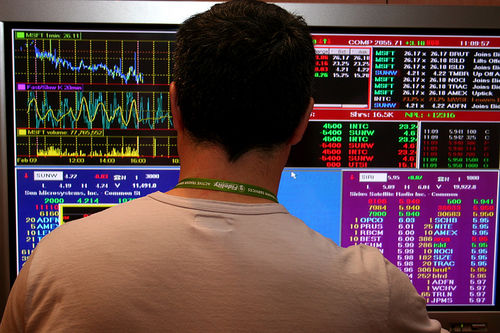(Reuters) - The Federal Reserve on Wednesday cut its forecasts for U.S. economic growth, but offered no hint of further monetary support, saying the recovery should gradually pick up heading into 2012.
Fed Chairman Ben Bernanke said factors weighing on the economy, such as high commodity prices, should be fleeting but warned some of the weakness could linger.
"Part of the slowdown is temporary and part of it may be longer lasting,".
The Fed estimated the economy should grow 2.7 percent to 2.9 percent this year, down from a forecast range of 3.1 to 3.3 percent made in April.
It also said it sees 2012 growth in a range of 3.3 percent to 3.7 percent, lower than its previous forecast.
In a statement, the central bank said a jump in commodity prices and supply-chain disruptions from Japan's devastating earthquake had weighed on growth and pushed up prices, but that those factors should dissipate over time.
The Fed confirmed it was ending its $600 billion bond-buying program at the end of June and reiterated it will continue to reinvest principal payments from its holdings.
By the time its latest "quantitative easing" program wraps up next week, the Fed will have pumped some $2.3 trillion into the economy.
"There are no hints of further easing from the Fed," said Nick Bennenbroek, head of Group of forex strategy at Wells Fargo in New York. "The statement overall disappointed investors looking for more bearish language and that's why we are seeing the dollar rally a little bit."
Bernanke, in a wide-ranging question-and-answer session with reporters which touched on issues as diverse as Greece's economic woes and the size of reserves that big banks should hold, conceded that U.S. economic hopes were partly hostage to events in Europe.
"If there were a failure to resolve that (Greek debt) situation, it would pose threats to the European financial system, the global financial system, and to European political unity," he said. "So yes, we did discuss it and it is one of several potential financial risks that we are facing now."
While Bernanke did not rule anything out, he made clear the Fed does not feel the economy is in as dire a condition as it was last fall when it launched its latest bond-buying plan.
If it were pressed into action, the Fed chief said the central bank could buy more securities, lower the interest rate it pays to banks on reserves held at the Fed or even pledge to keep its balance sheet at a high level for an extended period.
Bernanke said the vow to keep interest rates exceptionally low is intended to suggest the Fed is at least two or three meetings away from a move, but that the time period could be "significantly longer" depending on the economy.
Fed Chairman Ben Bernanke said factors weighing on the economy, such as high commodity prices, should be fleeting but warned some of the weakness could linger.
"Part of the slowdown is temporary and part of it may be longer lasting,".
The Fed estimated the economy should grow 2.7 percent to 2.9 percent this year, down from a forecast range of 3.1 to 3.3 percent made in April.
It also said it sees 2012 growth in a range of 3.3 percent to 3.7 percent, lower than its previous forecast.
In a statement, the central bank said a jump in commodity prices and supply-chain disruptions from Japan's devastating earthquake had weighed on growth and pushed up prices, but that those factors should dissipate over time.
The Fed confirmed it was ending its $600 billion bond-buying program at the end of June and reiterated it will continue to reinvest principal payments from its holdings.
By the time its latest "quantitative easing" program wraps up next week, the Fed will have pumped some $2.3 trillion into the economy.
"There are no hints of further easing from the Fed," said Nick Bennenbroek, head of Group of forex strategy at Wells Fargo in New York. "The statement overall disappointed investors looking for more bearish language and that's why we are seeing the dollar rally a little bit."
Bernanke, in a wide-ranging question-and-answer session with reporters which touched on issues as diverse as Greece's economic woes and the size of reserves that big banks should hold, conceded that U.S. economic hopes were partly hostage to events in Europe.
"If there were a failure to resolve that (Greek debt) situation, it would pose threats to the European financial system, the global financial system, and to European political unity," he said. "So yes, we did discuss it and it is one of several potential financial risks that we are facing now."
While Bernanke did not rule anything out, he made clear the Fed does not feel the economy is in as dire a condition as it was last fall when it launched its latest bond-buying plan.
If it were pressed into action, the Fed chief said the central bank could buy more securities, lower the interest rate it pays to banks on reserves held at the Fed or even pledge to keep its balance sheet at a high level for an extended period.
Bernanke said the vow to keep interest rates exceptionally low is intended to suggest the Fed is at least two or three meetings away from a move, but that the time period could be "significantly longer" depending on the economy.

No comments:
Post a Comment